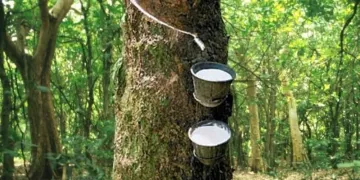Prime Minister General Prayuth Chan-ocha yesterday claimed success in curbing a planned protest by rubber farmers in the South, after pledging to raise the minimum price of the commodity to Bt50 per kilogram, which is the current global rate.
Prayuth assigned the permanent secretary of the Agriculture and Cooperatives Ministry to meet with an international group from rubber-growing countries and said this was another of his efforts to raise the local rubber price.
Other measures Prayuth cited include research and development to increase the quality of Thai rubber, better management and ways to boost the value of Thai rubber products.
The PM was speaking after chairing a key meeting yesterday of the National Rubber Policy Board, which comprises representatives of rubber farmers.
He said the meeting was productive, and thanked the rubber growers for their cooperation and decision to call off the planned rally on October 8 by a large number of rubber growers from 16 provinces at Government House.
Prayuth said the rubber price was a national issue and announced “the national train on the rubber-price agenda”.
“This is a single train, which is an express service, because the problem will be sorted out rapidly, and it will never derail.”
There were three measures already in place to reduce price problems, Prayuth said. A huge sum had been quickly distributed to rubber farmers at a rate of Bt2,520 per rai (Bt15,750 per hectare), plus Bt5 billion was recently approved for members of rubber cooperatives, with such cooperatives expanded and granted the status of legal entities.
It is not easy to solve the price problem, he said, as rubber prices are dependent on global demand and supply. And he said the former would remain low for the next few years.
Yesterday’s meeting agreed to accept 12 measures proposed by the ministry. Prayuth said he agreed with a measure to ensure value-added options for buyers, promotion of manufacture and sale of rubber bed mattresses, plus greater use of rubber pellets in road construction.
He said a policy to halve the number of rubber plantations from 500,000 currently would be adopted later, after controls on production volume proved effective.
Anant Lila, head of the Office of Agricultural Economics, said the 12 measures included a tax exemption for eight years to entitled farmers under Board of Investment assistance, the setting up of an industrial development institute for research and development, a policy to limit production volume, a capacity-building programme on technology transfer, and the promotion of local investment.
– nationmultimedia.com


























